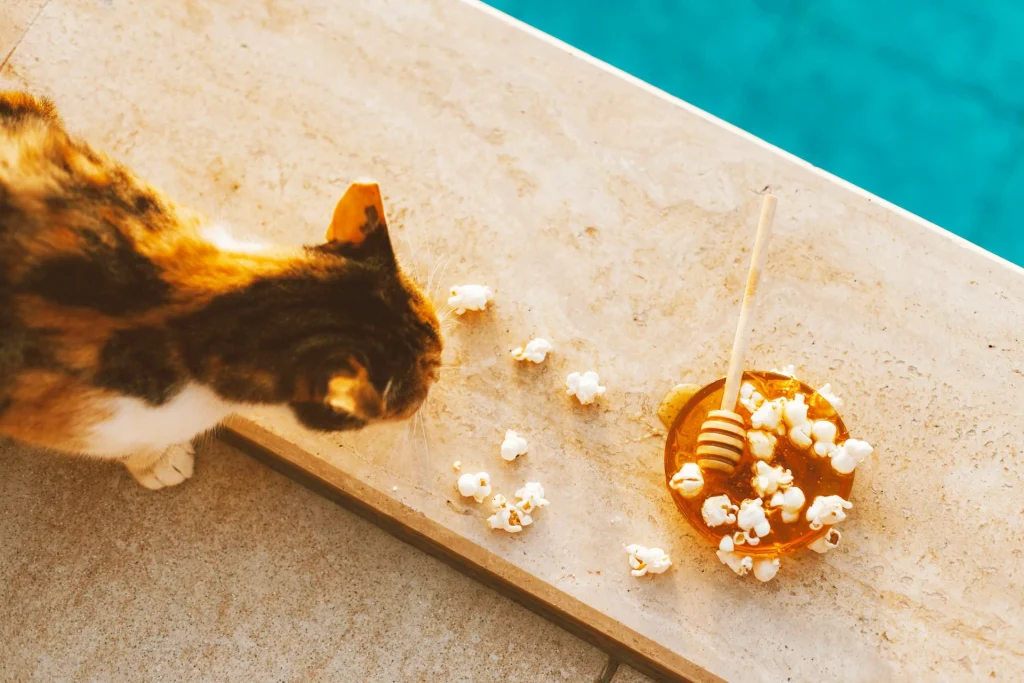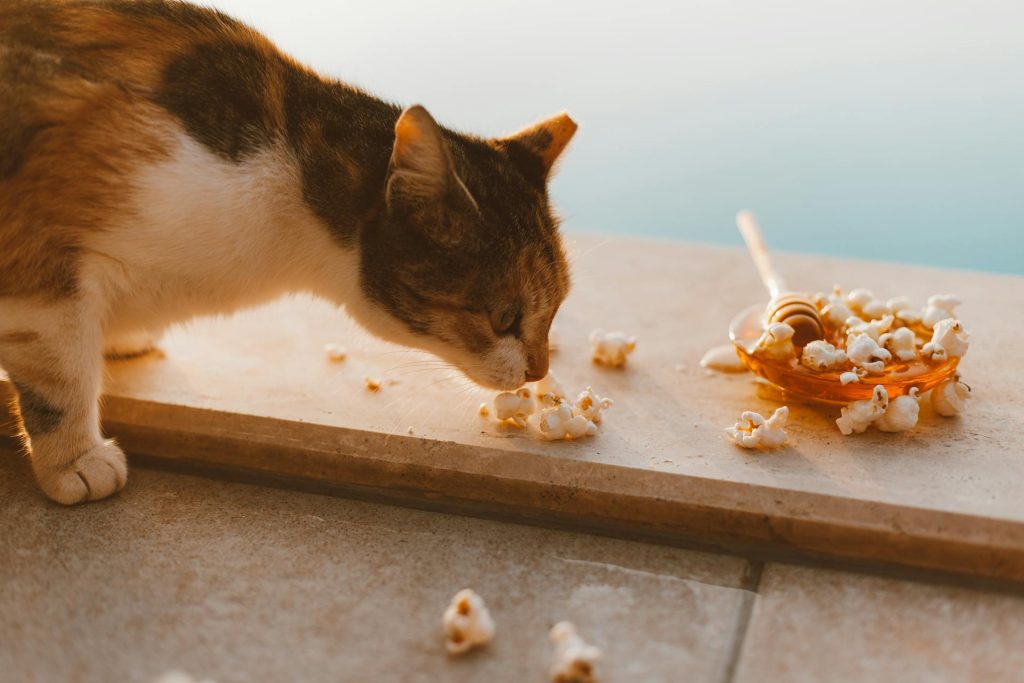Honey is a delicious treat that we use in a variety of dishes. But can cats eat honey, or should they stay away from it? As a cat owner it’s natural to question what’s safe for our feline friends. For us, honey has a million uses and benefits. We add it to tea, baked goods, confectionaries and even for medical uses. We aren’t the only species to find good use for honey. But would cats share the same benefits as us? In this article we will dive into the topic of this sweet product and answer all kinds of questions you may have about its safety for cats.
Benefits of Honey for Cats
There’s a lot of factors to explore when it comes to honey and its benefits for cats. Honey is known for its anti-inflammatory, antibacterial and antioxidant qualities. These benefits may be true for humans to some degree, but they may not apply to cats in the same way. So many plants and plant products out there are safe for us and toxic to cats, such as chocolate derived from cocoa beans. What about honey?
Cats are obligate carnivores and adept at digesting meat proteins, they are designed to process meat bone, and other animal parts. Sugars and carbohydrates would not be part of their natural diet. As a result, cats do not metabolize honey as efficiently as humans or even dogs.
One possible universal benefit of honey is its soothing effect on the throat. This can apply to cats as well. If a cat is suffering from a mild sore throat or cough, a tiny amount of honey might offer some relief. This would have a similar effect to how it soothes a human’s throat. Additionally, honey’s antibacterial properties could, in theory, help with minor skin irritations or small wounds if applied topically, rather than consumed.
Is Honey Nutritious for Cats?
Honey does contain some vitamins, minerals, and antioxidants, but these nutrients are not significant enough to benefit a cat’s health. Cats get their primary nutrition from meats, their prey or cat- tailored food products. Honey’s high sugar content can actually pose more risks than rewards. Whereas us humans enjoy honey as a source of energy, cats are unable to derive the same energy use due to their metabolism. It is crucial to note that any potential benefits of honey for cats are limited at best and outweighed by the risks.
Can Pets Eat Honey?
Sure we focus on cats here mainly but it’s good to note that honey isn’t universally harmful to all pets. Dogs, for example, can enjoy honey in moderation, and some birds even benefit from the antioxidants in honey. However, the same cannot be said for all animals, specifically cats.
Cats’ digestive systems are not equipped to handle high levels of sugars or carbohydrates, making honey a questionable addition to their diet. Cats may develop diabetes even from a high-carb diet and excessive weight. They cannot digest sugars well. While a lick or two of honey may not harm your pet, consistent or large quantities of honey can lead to problems like obesity, digestive issues, or even diabetes in cats.
Can Other Small Pets Eat Honey?
Though honey can be beneficial for some animals, it should still be given with caution. Dogs might safely consume honey in moderation, but rabbits and hamsters should avoid it due to their sensitivity to sugars. Always consult a vet before introducing any new food, including honey, into your pet’s diet.
Can Cats Eat Honey?
A cat can eat honey but it’s not healthy for them. While a cat may not be harmed by eating a little bit of honey, it’s not something they should eat. Extremely rarely if at all. They have different nutrition needs.
Cats do not need sugars in their diet, and honey’s high sugar content can lead to various health problems if ingested in significant amounts. Even though a small amount may not be toxic, honey is far from a natural food for felines.
Honey can cause an upset stomach or lead to vomiting and diarrhea in a cat. This is because a cat’s digestive system isn’t suited for handling high amounts of sugar. And honey is packed with sugars. If a cat eats too much sugar this would contribute to obesity and insulin-related issues. Check out our article about feeding dry food to diabetic cats.

Should Cats Eat Honey at All?
Cats don’t need honey in any amount, it is not part of their nutrition needs. In small, rare doses, honey is unlikely to cause severe harm. Given the risk of gastrointestinal distress and potential for long-term health problems, it’s best to avoid feeding honey to your cat altogether. If you want to offer your cat something sweet, look for treats specifically designed for feline consumption. For example freeze-dried chicken bites.
Do Cats Like Manuka Honey?
Manuka honey is special, it’s a type of honey known for its potent antibacterial properties, and is popular in the health food world. Could this superfood benefit cats too? While manuka honey is considered medicinal for humans, it’s not necessarily a miracle food for cats.
Most cats will not be naturally attracted to manuka honey (or to any honey) as they do not have taste receptors for sweetness. Unlike bears, they won’t try to climb your shelves for a taste of honey. If you do offer honey to your cat, it’s essential to do so sparingly.
Is Manuka Honey Safe for Cats to Eat?
Manuka honey is not toxic to cats, but that doesn’t mean it’s entirely safe for them. The concentrated antibacterial properties of manuka honey may actually irritate a cat’s digestive system. That would lead to stomach upset or other digestive issues. While cats can eat a tiny droplet of honey, it is not healthy for them.
If your cat is suffering from a skin infection or wound, manuka honey might be helpful if applied topically, but ingestion should be minimized.
Can Cats Eat Honey Products?
You might be wondering about whether cats can safely consume honey-flavored or honey-infused products. There are food items that might contain honey as an additive or flavor. Such as honey ham, honey nut cereals, and honey yogurt, contain honey in various quantities. These products unfortunately are not suitable for cats to consume and can pose a risk to their health. Cats should not eat honey products.
Can Cats Eat Honey Ham?
Honey-glazed ham tastes heavenly for humans but it’s not suitable for cats. Ham contains a lot of salt and fat, and the glaze adds a layer of sugar that cats simply don’t need. While a tiny bite of plain ham could be acceptable on occasion, it is definitely not recommended. The added sugars and preservatives can negatively impact a cat’s health, leading to digestive issues or weight gain over time. There are better options for cat treats.
Can Cats Eat Honey Nut Cheerios?
Although Honey Nut Cheerios are a popular breakfast cereal for people, they should not be fed to cats. Most cereals contain tons of added sugars, artificial flavoring, and carbohydrates that provide no nutritional benefit to felines. Even for human nutrition this would not be a balanced breakfast.
Since cats are carnivores, they require meat-based protein, not sugary snacks. One single piece of Honey Nut Cheerios is unlikely to harm your cat, but it certainly offers no health benefits.
Can Cats Drink Honey Water?
Honey water and tea with honey is often used as a natural remedy for a sore throat. Cats simply have no need for such a mixture. While cats technically could drink honey water, they shouldn’t do that. They get their daily hydration primarily from water or wet food, and adding honey to their water could irritate their stomach. The sugar in honey water can also lead to unnecessary weight gain, which may exacerbate other health issues like diabetes.

Can Cats Eat Honey Yogurt?
Yogurt can be beneficial for cats as long as it’s unsweetened and plain. Adding honey into the mix changes things. Honey yogurt contains additional sugars that cats cannot properly digest. For this reason, it’s best to avoid giving your cat any form of honey yogurt. If you want to offer yogurt as a treat, ensure it’s plain and free from any additives.
Other Foods Containing Honey
Many processed foods that we consume might contain honey as an ingredient, from baked products to sauces and meats. These foods should never be a part of your cat’s diet. Processed foods typically contain additives like preservatives, artificial flavors, and excessive sugars, all of which cats aren’t meant to consume. If you’re unsure whether a product contains honey, always check the label before sharing it with your cat.
Risks of Eating Honey for Cats
Feeding honey to your cat can pose several health risks. The most immediate concern is gastrointestinal upset, which may include vomiting, diarrhea, or general discomfort. Cats simply lack the digestive enzymes necessary to process sugars like honey effectively.
Long-term consumption of honey would lead to obesity, insulin resistance, or diabetes in a cat. Honey is highly caloric and rich in sugars, making it a poor choice for cats, especially those who are already overweight or have a sedentary lifestyle.
Can Honey Kill Cats?
Honey on its own is not toxic to cats, but it is extremely high in sugars. It can be dangerous in the long run if the cat consumes it on a daily basis. In extreme cases, excessive consumption of honey, combined with pre-existing health conditions such as diabetes, could escalate those conditions to a dangerous point. Therefore, it’s crucial to avoid feeding honey to your cat unless instructed otherwise by a vet.
Can Cats Eat Honey: How much?
A cat shouldn’t eat honey. But if you think you have to, then it should be done in tiny quantities. A mere drop or two is more than enough for a cat to taste without overwhelming their system. Anything more than that can lead to stomach upset. It’s best not to feed honey to the cat.
How Often Can a Cat Eat Honey?
Because of all the potential risks for cats with eating honey it is best not to feed them that. This should be done sparingly—if at all. If you do give honey to your cat, limit it to special occasions and extremely small portions, like a pea-sized drop. Regularly feeding your cat honey could result in long-term health complications, including obesity and diabetes.
Is Honey Used in Commercial Cat Food?
The good news is that commercial cat food does not typically contain honey. Cats have no dietary need for sugars, and cat food manufacturers usually avoid adding unnecessary ingredients that could harm their health. Instead, most commercial cat foods focus on high-protein, meat-based ingredients to meet a cat’s nutritional requirements.
Signs Your Cat Has Eaten Honey
If your cat has eaten honey, you might notice some immediate symptoms of gastrointestinal distress. If the cat has a negative reaction to honey the signs can include vomiting, diarrhea, or lethargy. Cats who eat honey can also show signs of restlessness and excessive licking. If their reaction and symptoms look alarming, do not hesitate to contact your veterinarian for advice on how to proceed.
Do Cats Like the Taste of Honey?
Cats lack the taste receptors for sweetness, which means they cannot perceive the taste of honey in the same way that we humans can. A cat might be curious about the texture or smell of honey, but most will not be drawn to honey as a treat. If your cat does show an interest in honey, most likely it is due to the novelty of the substance rather than an actual preference for its taste.
Final Thoughts
While honey offers multiple uses and health benefits for humans, it is not an appropriate food for cats. Cats can eat honey extremely rarely if you don’t want it to harm them. If you feed your cat honey it can lead to several health risks, including digestive issues and developing conditions such as obesity or diabetes. If you are not sure whether honey or other new treat might be suitable for your cat, always consult with a vet. Check out more about foods safe for cats in Cat Health 101: Can Cats Eat Mango?

FAQs
Is honey OK to give to cats?
In very small amounts, honey is not toxic to cats, but it’s not recommended as a regular treat due to the high sugar content. It’s best to avoid feeding honey to your cat altogether.
Why is honey bad for cats?
Honey is bad for cats because their digestive systems are not designed to handle sugars. Feeding honey to a cat can result in digestive issues like vomiting, diarrhea, and in some cases, it may contribute to obesity and diabetes.
Can cats get sick from eating honey?
Yes, cats can get sick from eating honey. If they consume too much, it may lead to stomach issues. Long-term consumption can result in chronic health conditions such as obesity and diabetes.
Why can’t cats taste honey?
Cats lack taste receptors for sweetness, which means they cannot perceive sugary tastes, including honey. Their diets are primarily focused on proteins, which is why they do not crave sweet foods.
Is honey good for sick cats?
Honey is not typically recommended for sick cats. While it may have antibacterial properties, it is not beneficial for treating most feline illnesses, and the risks often outweigh any potential benefits. Always consult your veterinarian before giving honey to a sick cat.
Also read: Cat Health 101: Can Cats Eat Pumpkin?

